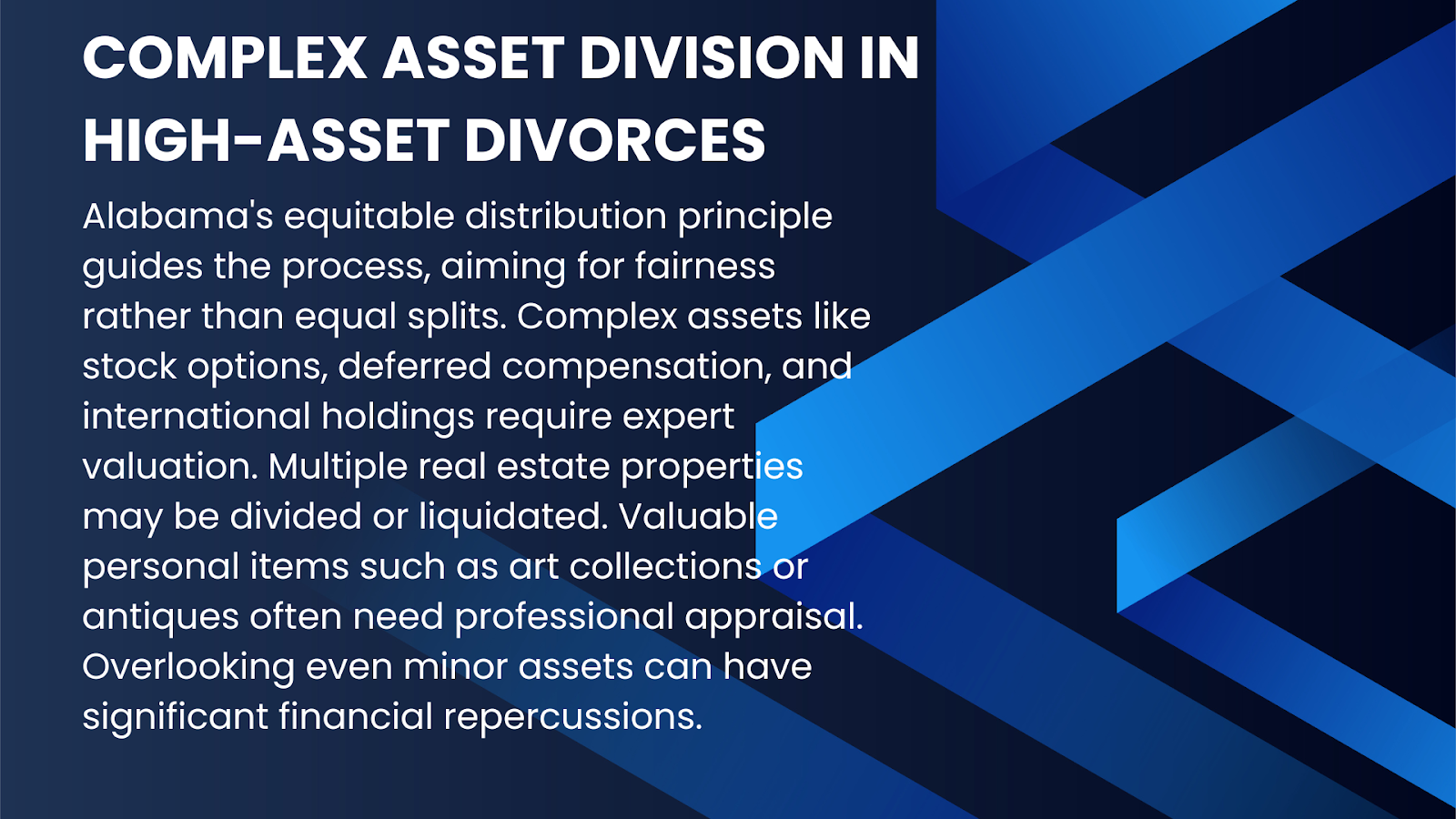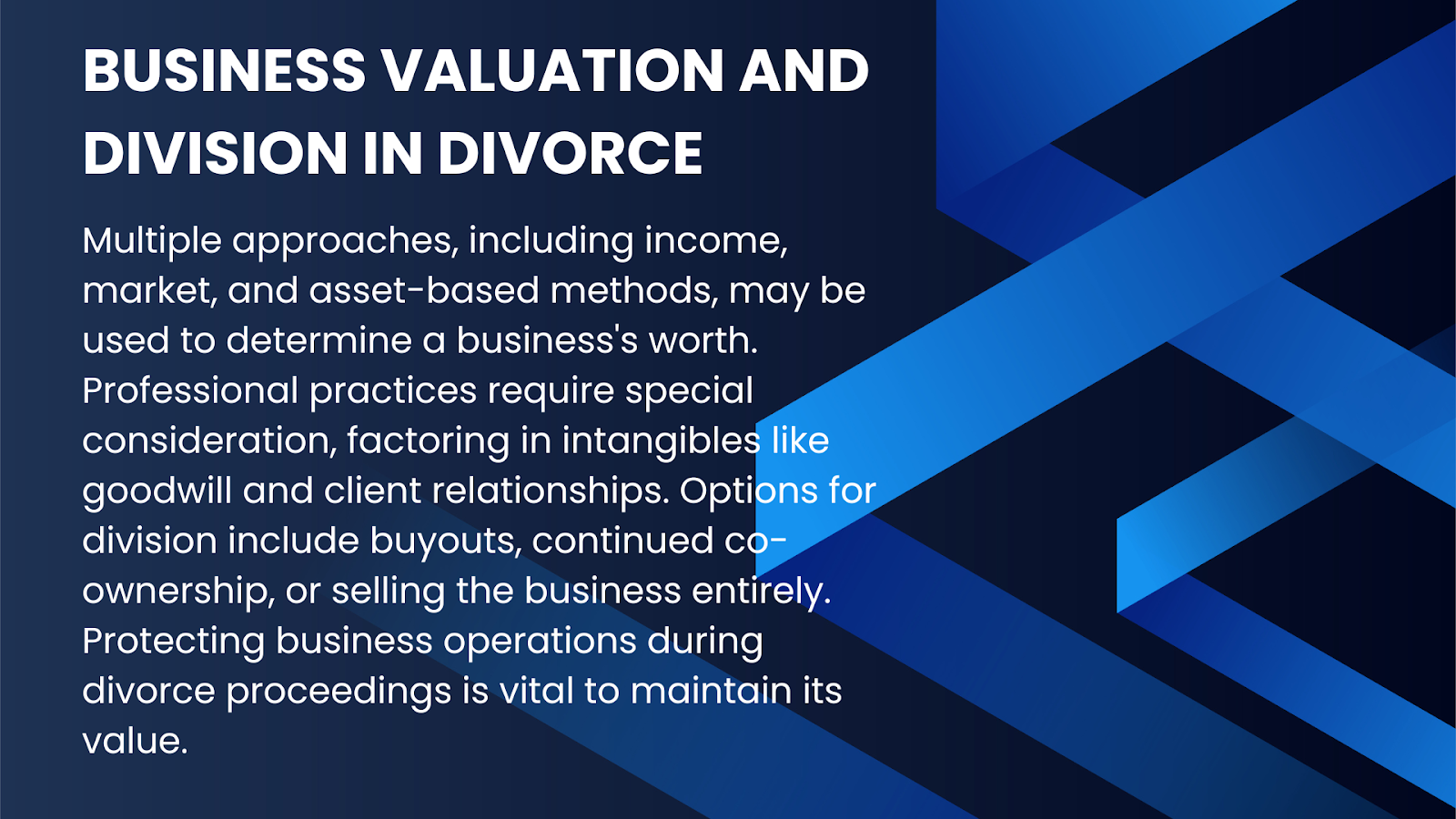Imagine discovering that your spouse's collection of rare wines is worth more than your house—welcome to the world of high-asset divorces.
In Alabama, where equitable distribution laws govern property division, navigating a high-asset divorce requires not just legal expertise but a sophisticated understanding of complex financial structures, business valuation, and tax implications.
Whether you're a business owner, a high-earning professional, or have inherited significant wealth, the outcome of your divorce can impact your financial future for decades to come.
At Baxley Maniscalco, we've guided countless clients through the labyrinth of high-asset divorces, protecting their wealth and securing their futures.
What Qualifies as a High-Asset Divorce?
While there's no strict monetary threshold, high-asset divorces typically involve:
- Net worth exceeding $1 million;
- Ownership of businesses or professional practices;
- Significant real estate holdings;
- Substantial retirement accounts or investment portfolios; and
- Valuable collectibles or luxury items.
Understanding whether your divorce falls into this category is crucial, as it determines the complexity of your case and the expertise required to navigate it successfully.
Unique Challenges in High-Asset Divorces
From hidden cryptocurrency accounts to offshore trusts, high-asset divorces often feel like unraveling a financial spy novel.
As such, these cases present several distinct challenges:
- Complex financial structures requiring expert analysis;
- Difficulty in accurately valuing certain assets;
- Potential for hidden assets or income;
- Complicated tax implications;
- High-stakes negotiations and potential for contentious litigation; and
- Privacy concerns and public scrutiny.
Recognizing these challenges early on allows you to prepare effectively, ensuring you're not caught off guard as your case unfolds.
Complex Asset Division
Dividing a pizza is easy; dividing a diverse portfolio of stocks, real estate, and intellectual property rights is anything but.
In high-asset divorces, asset division requires meticulous attention:
- Equitable distribution principles in Alabama;
- Valuation of complex assets like stock options, restricted stock units, and deferred compensation;
- Division of multiple real estate properties;
- Handling of international assets; and
- Strategies for dividing art collections, antiques, and other valuable personal property.
Remember, in high-asset divorces, overlooking even a seemingly minor asset can have significant financial repercussions down the line.

Business Valuation and Division
Your business isn't just your livelihood; it's likely your most valuable and complex asset.
Proper valuation and division are critical:
- Methods of business valuation (income approach, market approach, asset approach);
- Considerations for professional practices (goodwill, client lists);
- Options for dividing business interests (buyouts, co-ownership, selling the business); and
- Protecting business assets and operations during divorce.
The approach taken in valuing and dividing a business can make a difference of millions in your settlement, underscoring the importance of experienced legal guidance.

Hidden Assets and Forensic Accounting
In the high-stakes world of affluent divorces, some spouses might be tempted to play hide-and-seek with assets.
Uncovering the truth often requires financial detective work:
- Signs of hidden assets or income;
- Role of forensic accountants in uncovering financial discrepancies;
- Legal consequences of hiding assets in a divorce; and
- Strategies for ensuring full financial disclosure.
Remember, transparency is not just ethical—it's legally required. Hiding assets can severely backfire, potentially resulting in penalties and an unfavorable court ruling.
Tax Implications of High-Asset Divorces
In high-asset divorces, Uncle Sam often becomes an unwelcome third party.
Understanding the tax landscape is crucial:
- Tax considerations in property division;
- Alimony and child support tax implications;
- Capital gains tax issues in asset transfers;
- Tax implications of selling the marital home; and
- Qualified Domestic Relations Orders (QDROs) for retirement accounts.
A misstep in tax planning during your divorce can lead to a hefty and unexpected tax bill, making professional tax advice invaluable.
Protecting Separate Property
In the complex web of marital finances, safeguarding your separate property is like protecting a rare jewel.
Here's what you need to know:
- Definition of separate property in Alabama;
- Documenting and tracing separate property;
- Avoiding commingling of assets; and
- Burden of proof in separate property claims.
Properly identifying and protecting separate property can significantly impact your financial outcome in a high-asset divorce.
Alimony in High-Asset Divorces
When it comes to alimony in high-net-worth cases, the stakes—and often the figures—are high.
Key considerations include:
- Factors influencing alimony awards in Alabama;
- Types of alimony (periodic, rehabilitative, in gross);
- Duration and modification of alimony;
- Lump sum vs. periodic payments; and
- Impact of prenuptial agreements on alimony.
The alimony arrangement in your divorce can have long-lasting financial implications, making it a critical area for negotiation and careful planning.
Prenuptial and Postnuptial Agreements
Think of marital agreements as financial insurance policies—they're not romantic, but they can save you significant stress and money down the line:
- Enforceability of prenuptial agreements in Alabama;
- Key elements of a valid prenuptial agreement;
- Challenging or defending prenuptial agreements; and
- Postnuptial agreements and their effectiveness.
While not foolproof, well-crafted marital agreements can provide a roadmap for asset division and financial responsibilities, potentially simplifying your divorce process.
Strategies for Protecting Your Wealth
In a high-asset divorce, the right strategy can mean the difference between maintaining your lifestyle and starting over.
Consider these approaches:
- Importance of early and thorough financial documentation;
- Assembling a team of experts (financial advisors, accountants, appraisers);
- Negotiation vs. litigation: pros and cons;
- Mediation and collaborative divorce options; and
- Protecting your credit and financial accounts during divorce.
Remember, the goal is not just to win the divorce but to secure your financial future. Sometimes, a strategic compromise can lead to the best long-term outcome.
Frequently Asked Questions About High-Asset Divorces in Alabama
Navigating a high-asset divorce can feel like solving a complex puzzle.
Here are answers to some of the most common questions we encounter about high-asset divorces in Alabama.
How Long Does a High-Asset Divorce Typically Take in Alabama?
High-asset divorces in Alabama can take anywhere from 6 months to 2 years or more, depending on the complexity of the assets and the level of conflict between parties.
Thorough asset valuation and potential litigation can extend the timeline.
Can I Protect My Business in a High-Asset Divorce?
Yes, there are several strategies to protect your business, including buy-sell agreements, trusts, and proper valuation. The key is to work with experienced professionals who can help you navigate the complexities of business ownership in divorce.
How Are Retirement Accounts Divided in a High-Asset Alabama Divorce?
Retirement accounts are typically considered marital property and are subject to equitable distribution.
The division often requires a Qualified Domestic Relations Order (QDRO) to avoid tax penalties.
What If My Spouse Is Hiding Assets?
If you suspect your spouse is hiding assets, we can employ forensic accountants and use legal discovery processes to uncover hidden wealth.
Concealing assets can result in severe penalties imposed by the court.
How Can I Protect My Inheritance During a High-Asset Divorce?
Inheritances are generally considered separate property in Alabama if they haven't been commingled with marital assets.
Proper documentation and maintaining the inheritance in a separate account are crucial for protection.
Will My High-Asset Divorce Go to Trial?
While many high-asset divorces are settled through negotiation or mediation, some do go to trial, especially when there are complex assets or high-conflict situations.
Our goal is to achieve the best outcome for you, whether through settlement or litigation.
How Does Alabama's Equitable Distribution Law Affect High-Asset Divorces?
Alabama's equitable distribution law means that marital property is divided fairly, but not necessarily equally.
In high-asset cases, this can lead to complex negotiations and valuations to ensure a fair distribution.
Take Control of Your Financial Future
Don't leave your wealth to chance. Our experienced team at Baxley Maniscalco is ready to safeguard your assets and secure your financial future.
Contact us now for a confidential consultation and let's craft a winning strategy for your high-asset divorce.
